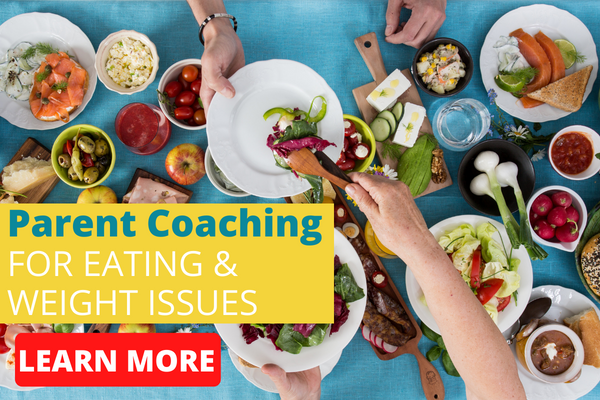
These headlines are from news sources that promise to tell us the latest and greatest, research-based information about our health. For those of us who have/had eating disorders, these types of headlines are more than just clickbait – they tap into the obsessive side of ourselves that desperately wants to follow rules and be OK. Someone with an eating disorder sees these headlines and wants to follow them. Someone with an eating disorder has body size to our self-worth, and they want to do what the “experts” tell us is “healthy.”
If you have a child who has an eating disorder, please open regular conversations about how headlines like this can trigger eating disorders. Help them work through the painful act of rebelling against the words that tell us how to be healthy by restricting food, dieting, and over-exercising. Help your child maintain recovery by reminding them that true health is accomplished only when we accept our bodies and don’t live in fear of food and fat.
Here are some key triggers for those of us who have/had eating disorders when we see headlines like this:
Headlines that suggest we should “eat less” or “exercise more.”
The assumption in these headlines is that we all need to lose weight. Even if the headline doesn’t explicitly state weight loss as the goal, we all know that the reason why we want to “trick” ourselves into eating fewer calories or “motivate” ourselves to exercise more is to lose weight. This assumption is deeply triggering to someone who has an eating disorder.
In recovery, your child will work hard to realize that their body is fine just as it is and that they don’t need to control, starve them, or purge the body of food. Additionally, simply eating less and exercising more is not a recipe for losing weight long-term. Diets based on this recipe fail 95% of the time and actually result in weight gain. That’s a tremendous failure rate, and yet headlines continue to promote diets as if they are scientifically valid.

Body Image Printable Worksheets
Colorful, fun, meaningful worksheets to improve body image!
- Boost confidence
- Improve self-esteem
- Increase media literacy
Headlines that suggest weight is linked to being “good” or “bad.”
Any suggestion that restricting food or exercising makes us ‘good’ can lead people with eating disorders to feel intense shame and guilt. In our recovery, your child needs to learn inherent worthiness decoupled from weight, food intake or exercise patterns. Yet everywhere we go, we read about “cheat days,” and how to trick our bodies into either eating less or exercising more. These messages can upset your child’s recovery chances.
Before and after images showing someone who has a larger belly and then a smaller belly.
This is the oldest diet marketing trick in the book. The image of someone’s belly looking distended and then small, as magically influenced by a restriction-based diet and/or over-exercising induces a visceral response for most of us. Most people feel disgusted by the ‘before’ and deeply desire the ‘after.’ Before and after images tell us that fat is gross and controllable. This is called weight stigma, and it’s a form of discrimination. It’s also deeply triggering for people who have eating disorders and have associated small body size with being worthy and “good.” These images are fatphobic and set unrealistic expectations for what a diet can accomplish.
Headlines that suggest a direct link between health and a specific food.
Nutrition science is limited to correlation. We simply cannot run human studies to determine whether there is causation between food, weight, and health. But media outlets love it when nutrition scientists find even a statistically insignificant correlative link between a particular food and a particular health outcome. Scientists frequently speak out against how their research has been presented in the media, but the media still persists in presenting statistically insignificant correlative data as fact.
Headlines that suggest there is a link between exercise and weight.
It has been proven that exercise, while it has many benefits, does not lead to weight loss. In fact, for many people, exercise increases appetite and therefore weight gain. But exercise-driven headlines are very popular. Over-exercising is a frequent precursor to eating disorders and often accompanies food-based restriction, binging and purging.
Keep this in mind as you work to reduce the media impact on your child’s eating disorder and body image.

Ginny Jones is on a mission to empower parents to help their kids recover from eating disorders, body image issues, and other mental health conditions. She’s the founder of More-Love.org, an online resource supporting parents who have kids with eating disorders, and a Parent Coach who helps parents who have kids with mental health issues.
Ginny has been researching and writing about eating disorders since 2016. She incorporates the principles of neurobiology and attachment parenting with a non-diet, Health At Every Size® approach to health and recovery.

